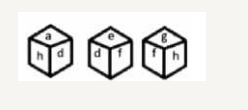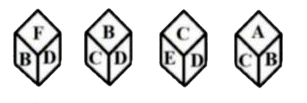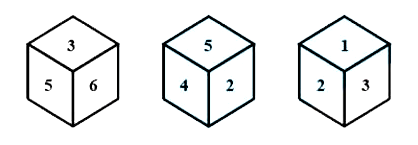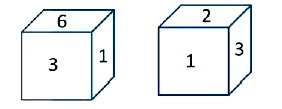Three different positions of the same dice are shown. Select the letter that will be on the face opposite to the one having 's'.
एक पासे के तीन पद दिए गए है | 's' के विपरीत कोण सा अक्षर आएगा ?

a
f
e
d
Step by step video & image solution for Three different positions of the same dice are shown. Select the letter that will be on the face opposite to the one having 's'. एक पासे के तीन पद दिए गए है | 's' के विपरीत कोण सा अक्षर आएगा ? by Reasoning experts to help you in doubts & scoring excellent marks in Class 14 exams.
Updated on:21/07/2023Topper's Solved these Questions
Similar Questions
The different positions of the same dice are show . Select the letter that will be on the face opposite to the one having 's'.

View SolutionThree different positions of the same dice are shown. Select the letter that will be on the face opposite to the one having 'f'.
एक पासे के तीन पद दिए गए है |'f' के विपरीत कौन सा अक्षर आएगा ?
View Solution
Knowledge Check
Three different positions of the same dice are shown . Select the letter that will be on the face opposite to the one having 'f'.
 AaBdCgDh
AaBdCgDhThree different positions of the same dice are shown. Select the patterm that will on the face opposite of the one having '+'
 A&B$COD#
A&B$COD#Three different positions of the same dice are shown. Select the number that will be on the face opposite to the one having 3.
 A5B6C4D1
A5B6C4D1
Four different positions of the same dice are shown. Select the letter that will be on the face opposite to the one having B.

View SolutionThree different positions of the same dice are shown.Select the number that will be on the face opposite to the one having 5.

View SolutionThree different positions of the same dice are shown. Select the number that will be on the face opposite to the one having 5.

View SolutionTwo different positions of the same dice are shown. Select the number that will be on the face opposite to the one having '4'.

View SolutionTwo different positions of the same dice are shown. Select the number that will be on the face opposite to the one having '6'.

View Solution

